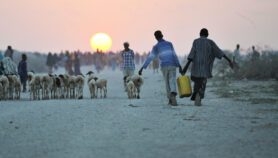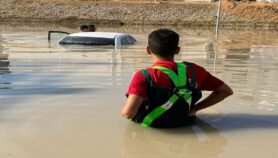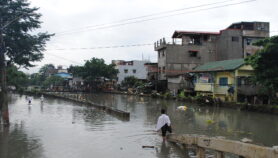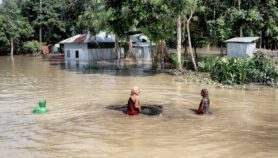By: Dustin Silvey
Send to a friend
The details you provide on this page will not be used to send unsolicited email, and will not be sold to a 3rd party. See privacy policy.
The early morning air of the Indonesian rainforest is hazy with smoke. Staff of the charity International Animal Rescue (IAR) breathe through cloth masks as they search for a dehydrated — and possibly dying — orangutan and her infant spotted the previous night.
Over the last month, 63 bush fires have ravaged the island of Borneo. The Center for International Forestry Research says that this year’s fires in Borneo and in other parts of Indonesia could be the worst since 1997. The fires, often started to clear land for palm oil plantations or by discarded cigarette butts, create a smoky haze that has closed airports in Indonesia. The haze has also enveloped several neighbouring South-East Asian countries, even closing schools in Singapore. The fires are not only causing severe health problems for people living in and around affected areas, but also for forest animals.
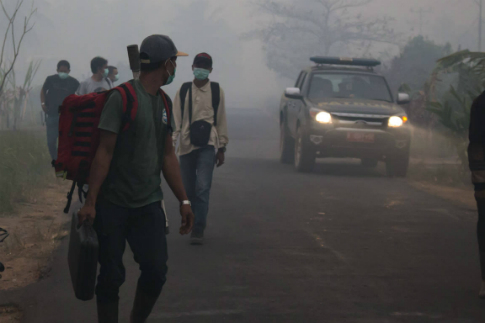
“Orangutans in Indonesia are already under extreme pressure from the destruction of their habitat as deforestation to make way for palm oil plantations continues unabated,” says Alan Knight, CEO of IAR, at its orangutan sanctuary in West Kalimantan, the Indonesian portion of Borneo. “Our team is witnessing first hand the devastating impact of the fires on orangutans and dealing on a daily basis with the victims of this environmental disaster.”
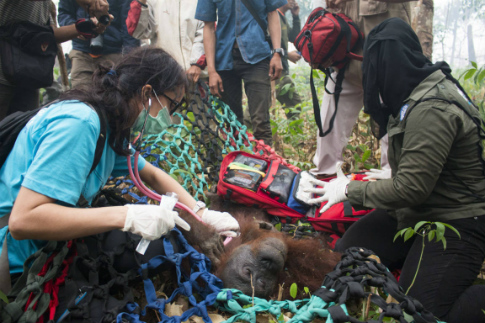


On top of dealing with fire damage to its sanctuary, IAR has also been taking in more and more orangutans. Staff go out to find orangutans that have become trapped, hurt or orphaned by fire or smoke.
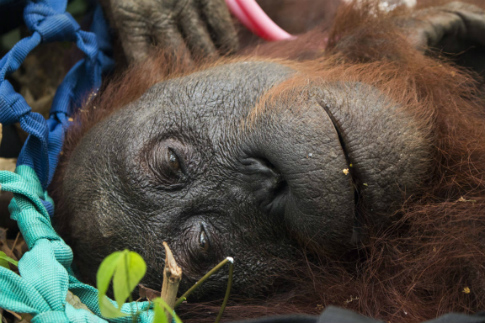


Villagers often spot orangutans in trouble and alert IAR. Karmele Llano Sanchez, a vet who is the charity’s programme director in Indonesia, has led several trips into the forest to rescue orangutans this fire season. The most recent was to save a mother and daughter orangutan spotted near a palm oil farm, which had been burning for the previous five days. After several hours searching through the haze, they finally found the pair. The animals were anaesthetised and given a medical check up to determine if they could survive in a safe zone away from the fires or if they needed to be transported to the IAR sanctuary to recover.
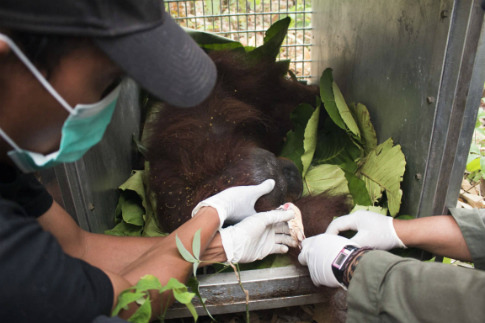


These orangutans were lucky: IAR go to them before the smoke caused much damage and they were taken to a safe zone on the island. “We hope these two orangutans will get another chance in this new location,” says Sanchez. “Although they will never be completely safe from fires or other threats, it is important that the orangutans can remain in this area where they belong.”
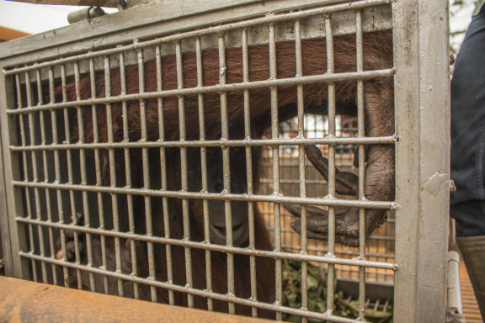


Fire commonly orphans orangutans. Over the past month, IAR has taken in five orphaned baby orangutans in West Kalimantan. “This baby is a female orangutan,” says Sustyo Iriyono, head of the IAR sanctuary, of the small primate he holds. “Her name is Seponti, after the place where she was found.” A local villager found Seponti weak and dehydrated from the effects of the smoke and could not find her mother.
He took Seponti home and cared for her as a pet, hoping to keep her. However, keeping orangutans as pets in Indonesia is illegal and can result in two years in jail. After 11 days, after pressure from his neighbours, the villager took Seponti to the IAR sanctuary, a three-hour journey on foot.
There are now only about 40,000 orangutans left on the island of Borneo. Fire is the main cause of the decline in their number, with over 80 per cent of their habitat destroyed in the last 20 years.
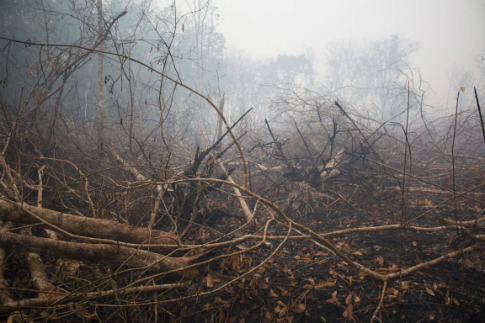


Researchers believe the devastating 1997 fires wiped out over a third of the population, and that the current fire season could cause even more damage if it carries on much longer. Poaching also reduces their numbers, as mothers are killed for their babies, which are illegally sold as pets throughout Asia.
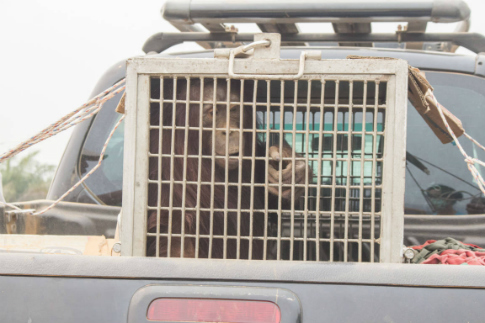


In response to the decline of orangutans in the wild, several NGOs have set up sanctuaries across Borneo that work to rescue orangutans that have been taken from their mothers or have been orphaned. One palm oil company, PT Kayung Agro Lestari (PT KAL) has even started conserving parts of a 18,000 hectare plot of land in West Kalimantan to protect orangutans and help lower carbon emissions from deforestation.
“With orangutan habitat disappearing rapidly because of forest conversion in Kalimantan, every remaining piece of forest is worth saving,” says Sanchez. “The involvement of the oil palm industry in protecting orangutan habitat is crucial for the survival of the species.”
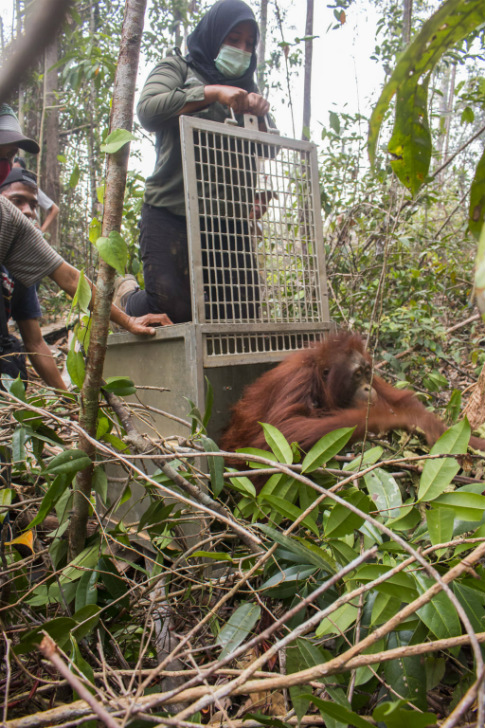


Unfortunately, parts of many of the NGO sanctuaries and areas of the PT KAL site have been damaged or destroyed by the fires. Many have had to move animals to smaller safe zones on other areas of the island. This devastation could have a long-lasting impact on conservation efforts across the island: with less land to use as sanctuaries, the orangutans and NGOs might be fighting a losing battle.
“The world cannot afford to ignore this crisis any longer. If we don’t act to save the orangutan and its habitat, they will both be lost to us forever,” says Knight. “And if ever there was a time to act, that time is now.”
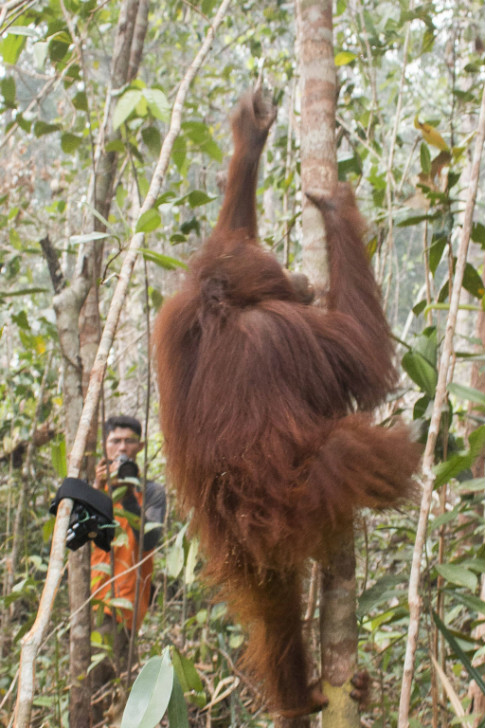


Images courtesy of International Animal Rescue – Heribertus Suciadi





